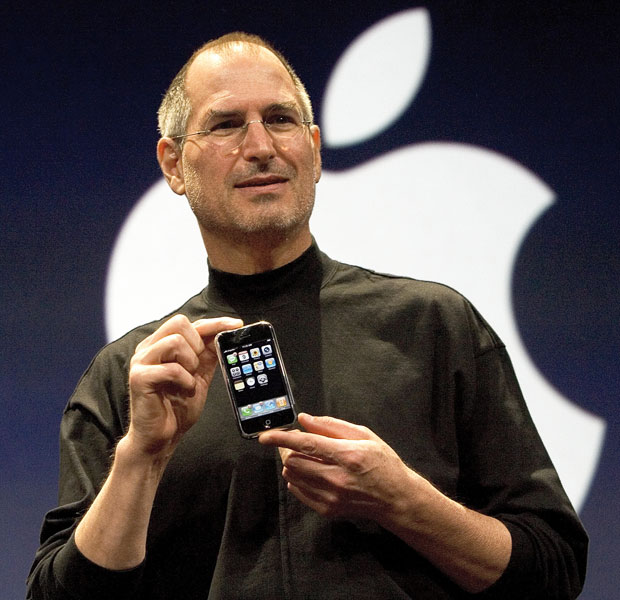I was at Qualcomm last week, listening to an economist talk about Apple’s complaints that Qualcomm had charged Apple too much for access to patents. What I thought was fascinating was that Apple had folks focused on the 5 percent that Qualcomm had charged it instead of on the massive profit that Apple made on each phone.
The price of the iPhone 8 is rumored to be well over US$1,000 — but it could cost well under $500 to build. (Check out this WSJ video on how you can build a decent smartphone for less than $70 in China.)
All other smartphone prices seem to be trending down, while Apple’s appear to be trending up. This near-magical behavior is an example of expert manipulation, and in a world of fake news, it’s suddenly a more interesting topic to cover. (It also suggests that Apple’s level of control over its customer base could be an anti-customer, if not an antitrust, problem.)
Oh, and that’s on top of the issues that may prevent the iPhone from being shipped in the first place.
I’ll use Apple as an example to illustrate the art of manipulation and misdirection — although it’s hardly the only one that engages in it. I’ll close with my product of the week: a new router from Symantec that may be the perfect thing for securing your home in a hostile world.
Art Appreciation
There’s an art to manipulation and misdirection. I first became aware of this skill in college while doing my undergraduate work. One of the modules in a class I took on manpower management was on manipulators — people who were good at getting people to do things for them, changing minds, and generally, well, manipulating others.
There was a test for measuring this skill, and the scoring range was 1-20. Anyone who scored more than 12 had a high inherent ability to manipulate, according to the test. One poor guy scored 15 and everyone in the class made fun of him. However, there was another student who scored 17, and no one even noticed. He was the one who focused the rest of us on the guy who scored 15 — and he didn’t even know he was doing it.
People with this skill often end up in marketing where their ability is valued and utilized. If you are observant, however, you’ll see the same skill applied by friends, family and coworkers — both to accomplish their unique goals and often just to mess with people. Surprisingly, the person doing it often doesn’t even seem aware of the behavior.
The Talented Steve Jobs
The most powerful natural manipulator I’ve ever seen was Steve Jobs (much of what I’m talking about is covered in the book iCon Steve Jobs: The Greatest Second Act in the History of Business). Jobs changed a lot in skill level from when he first helped found Apple to his return to the company. At first, he seemed to be unaware he was doing it. Sometime between when he was fired from the company and his comeback, he became an expert.
Before he left, there were stories of all the drama that seemed to go on around him, which often is one of the indicators of a manipulator operating on autopilot. They tend to enjoy getting people worked up and often haven’t yet realized that to be effective they need to be very subtle. Jobs wasn’t, and eventually he overreached and got himself fired.
When he came back, though, he seemed able to get what he wanted without as much drama. Things just seemed to fall into place magically, and his skills at marketing blossomed.
For example, Apple’s product line sucked at the time, and prior to coming back to the company, Jobs had been outspoken about that. After getting the job, he immediately reversed himself and praised the products, becoming their greatest advocate.
Throughout his time, he successfully prevented strong challengers for the iPod from HP and Dell, and disparaged the Microsoft Zune so successfully — characterizing as “stupid” unique compelling advantages like video playback (which the iPod back then didn’t have) — that the iPod largely remained unchallenged by anything but the iPhone.
Even with the iPhone, he caught the market flatfooted. The first iPhone was basically an iPod with poor phone features, but Jobs convinced massive numbers of people they had to have it long before it was really a competitive product. He achieved that through a combination of brilliant placement, advertising, and a very nice — but largely cosmetic — design.
While Jobs is no longer at Apple — and I really don’t see anyone there with his kind of manipulative genius — the firm clearly is still operating like it can control hearts and minds. However, without a hit since the iPad, it should be becoming clear to most that post-Jobs Apple doesn’t have the capability that Steve Jobs’ Apple had in spades.
Apple vs. Qualcomm
While the Apple vs. Qualcomm fight seems to be about pricing, it is potentially much more than that for Apple. This is largely because most people still see Apple the way it was and not the way it is. Otherwise, its market valuation would have fallen sharply.
I saw this when Steve Ballmer ran Microsoft. It held value for a long time, but when Steve tried to buy Yahoo — something that appeared to most to be incredibly stupid — the market suddenly realized that Steve’s Microsoft and Bill’s Microsoft were very different — and even though Microsoft’s financial performance was stable for the most part, its valuation fell like a rock.
To hold, Tim Cook can’t have a moment like Steve Ballmer did at Microsoft, when people suddenly open their eyes and realize that Apple doesn’t seem capable of producing hits — or worse, when Apple’s only differentiator is that it is far more expensive than the rest. To be clear, that was pretty close to what Apple almost became before Steve Jobs came back and saved the firm.
This lawsuit with Qualcomm is forcing a lot of folks to look at Apple’s falling quality, to start looking at the problems with their Apple devices as less unique and more endemic of that falling quality, and to start seeing Apple as having shifted too sharply from being focused on creating magic for customers to being far too focused on increasing margins.
At the very least, it’s forcing people to realize that Apple is shifting from using the best technology in its very high-priced products to trying to cover up that the devices aren’t very competitive anymore in either capability or price.
Like the Apple Watch, the new HomePod appears to be just a different expensive spin on an existing market — unique only because of its high price and connection to Apple’s ecosystem. Even in Apple accounts, the Amazon Echo is surveying as the more popular product — and outside of Apple accounts, the HomePod almost falls beneath consideration.
In short, the products clearly art showcasing that Apple has weakened significantly, but the disclosures from the Qualcomm lawsuit could become the trigger that finally gets people to look at the company differently — much like Yahoo did for Microsoft.
Wrapping Up: Trump
It’s hard to write anything about manipulation and misdirection without mentioning our president, who seems also to be a natural at it. However, unlike old Jobs, he seems to do a lot of it without focus or purpose, which is why so many of the problems President Trump is dealing with seem to be self-created. It is this contrast between the older Jobs and President Trump I want to leave you with.
Manipulators can be incredibly powerful tools or they can be self-destructing disasters depending on their focus and maturity. Young Steve Jobs was the latter, old Steve Jobs the former, and he clearly made Apple great again. President Trump has the core capability, but he currently lacks the maturing experience that, ironically, I think Jobs got as a result of being fired from Apple.
Apple either needs to recreate the capability it lost when Jobs died, or stop tempting fate by taking risks that will cause people to see the company differently. As Steve Ballmer discovered, once the market corrects, the eventual outcome is not a great one for the career of the CEO or the image of the firm.
One final thought: At some point, manipulators need to realize that without good goals they’ll end badly, and the rest of us have to decide if we’re OK with being manipulated. In this age of fake news from all sides, I’m wondering how many of us have made an unfortunate decision in this regard, by accident.
We live in a very hostile world, and back at CES I saw one product that I thought addressed best the kind of threats we now face as homeowners or owners of small businesses. Symantec announced a high-performance router, the Norton Core Router, that not only provided distributed wireless networking but also incorporated a comprehensive security solution.

Using a combination of Qualcomm’s advanced wireless networking technology and Symantec’s antimalware resources, you could have one product and a subscription that, on paper, should keep your home or small business not only well connected with the highest speed 4X4 MU-MIMO technology — providing speeds that rival what you can get with wired connections — but also better protected, ensuring your connected devices aren’t infected by viruses or otherwise used against you. The system just became available for preorder at a $30-off price of $249.
It isn’t even bad looking, with a design that could allow you to put it in a far more visible and advantageous networking position than in a cabinet or in a closet (if your wiring allows it). We need more comprehensive solutions like this if we are going to protect our ever-more-connected homes from an ever-more-hostile world. As a result, the Norton Core Router is my product of the week.
























































